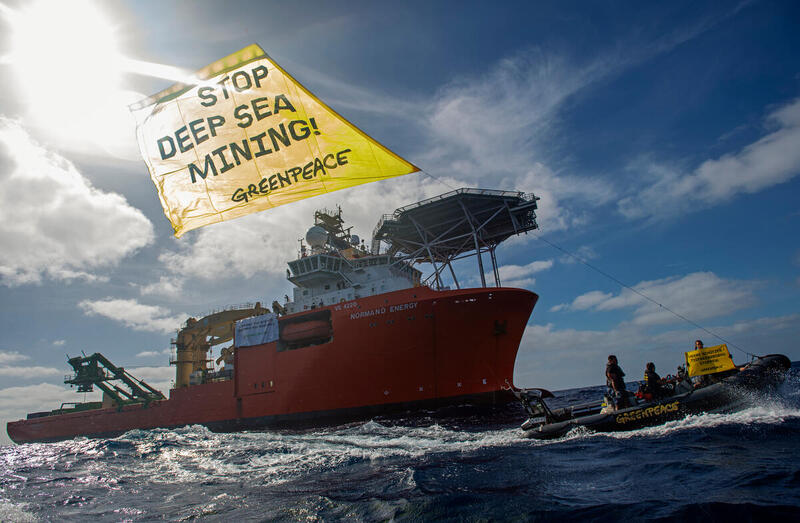ACTION: Stop Deep-sea Mining Before It Starts
Greenpeace
The deep sea is a treasure trove of biodiversity and home to untold wonders and possibilities. It is also one of our best allies against climate change. But a threat is coming: deep-sea mining. The good news is we can stop this industry before it’s too late, but we don’t have much time.
Deep-sea mining companies are pressuring governments to let them go down there, several thousand meters below the surface of the ocean, and plunder the seabed to extract metals. If this industry is allowed to start, gigantic machines weighing more than a blue whale will be lowered onto the ocean floor to plunder these pristine ocean ecosystems.
Imagine if we could go back in time and stop offshore drilling at the dawn of the oil age and prevent environmental and climate catastrophes. This is where we are at with deep-sea mining.
This is a once in a generation opportunity: to stop another extractive industry from damaging the global oceans the way the fossil fuel companies have done to the climate.
Governments need to take a strong stand against deep-sea mining. They have to publicly call for this industry not to start and take action to protect the deep ocean.
ACTION: Join us by signing the petition.
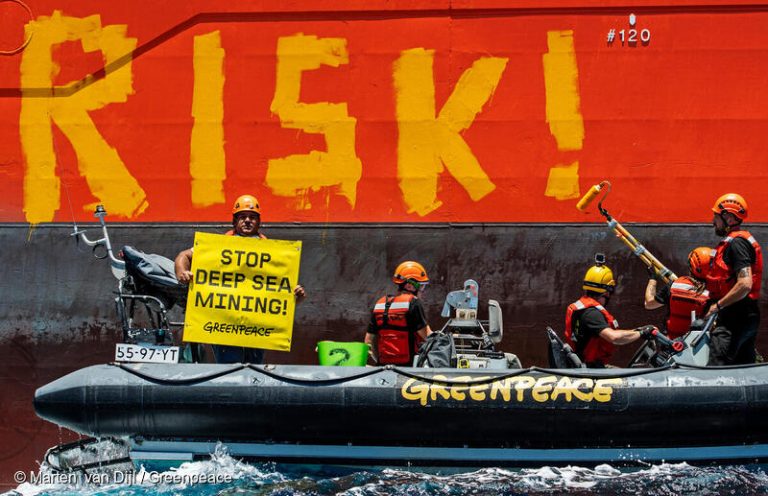
The Consequences of Deep-sea Mining
Greenpeace
Greenpeace is working to prevent a new destructive extractive industry from ever getting started in the oceans. Our position: no deep-sea mining, ever. To achieve that, we are joining Pacific communities, champion nations, and dozens of allied organizations across the globe in calling for a UN moratorium on deep-sea mining.
In a planetary emergency, why would governments open up a new frontier for mining in the ocean — and who is pushing them to do so? Greenpeace is working to prevent a new destructive, extractive industry from ever getting started in the oceans.
What Is Deep-sea Mining?
Deep-sea mining is a new, highly-destructive extractive industry that is on the cusp of launching into our global oceans. Mining companies like GSR Deme and Deep Green are seeking to launch disruptive and untested methods on the planet’s deep seabeds to extract minerals such as nickel and cobalt, pitching it as a necessary solution for the world’s clean energy transition.
We now face a once in a generation opportunity to stop an industry from gaining a foothold and ravaging one of our last biodiverse boundaries: the precious ecosystems of the ocean’s floor. We can defend this boundary by boldly asking government policy makers and forward-thinking clean transportation and tech companies to take a stand.
We know more about the surface of Mars and the moon than about the deep ocean. From underwater mountains providing oases for sea creatures to towering spires resembling sunken cities, the deep ocean is full of mysteries. As the largest habitable space on Earth, the deep ocean is home to ancient coral reefs sustaining the oldest known lifeforms, trenches deep enough to hold Mount Everest, and mysterious animals that can live for hundreds of years. Scientists discover new species on practically every voyage down to the depths.
This unique, living world is under threat from the nascent deep-sea mining industry. Deep-sea mining risks inevitable, severe, and irreversible environmental damage to our oceans and marine life. Right now, we are at a crucial moment in history. Governments and corporations have been granted licences to explore for deep-sea mining in ecologically sensitive waters, and the industry is positioning its development as essential and inevitable.
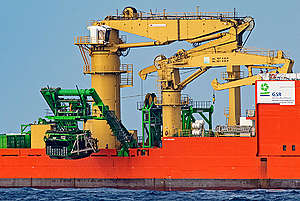
Can We Stop Deep-sea Mining?
Although test mining is underway, commercial mining is not yet allowed by international law. But our window to stop a new highly destructive industry before it starts is closing fast. In July 2021, the country of Nauru announced intentions to begin deep-sea mining. The announcement triggered an obscure “2-year rule” in international law, meaning that by July 2023 mining may commence, with whatever rules and safeguards are in place — or the lack of them.
If mining begins, industrial-scale mining machines will enter our oceans and destroy unique underwater worlds — affecting not just the weird and wonderful creatures living in the depths, but putting the ocean creatures swimming across our global oceans at risk. By impacting on natural processes that store carbon, deep-sea mining could even make climate change worse.
How Can We Stop Deep-sea Mining?
Greenpeace is working on multiple fronts to stop deep-sea mining before it ever starts:
Corporate Engagement
Greenpeace is engaging the potential end users of deep-sea mining, the automakers, battery companies, and tech corporations that utilize so-called “energy minerals”, which are the primary target of deep sea miners. By gaining commitments to never use deep-sea minerals, we aspire to cut off demand for ocean destruction before there ever is a supply.
Our transition to a fossil fuel free future must be ethical and sustainable, and not come at the expense of destroying our planetary boundaries. To achieve this, commercial deep-sea mining must never begin.
Pacific Communities
Communities across the Pacific are on the frontline of deep-sea mining. They have the most to lose from operations gone wrong, from damages to abundant fisheries to sedimentation of the beautiful coral reefs that are central to Pacific culture and sustenance, and climate change impacts that could eventually drive these communities from their ancestral homes.
Greenpeace global network is working with long-standing Pacific activists who don’t want to see deep-sea mining off their shores. These are the frontline heroes in this battle, and our role in the Pacific is to support them.
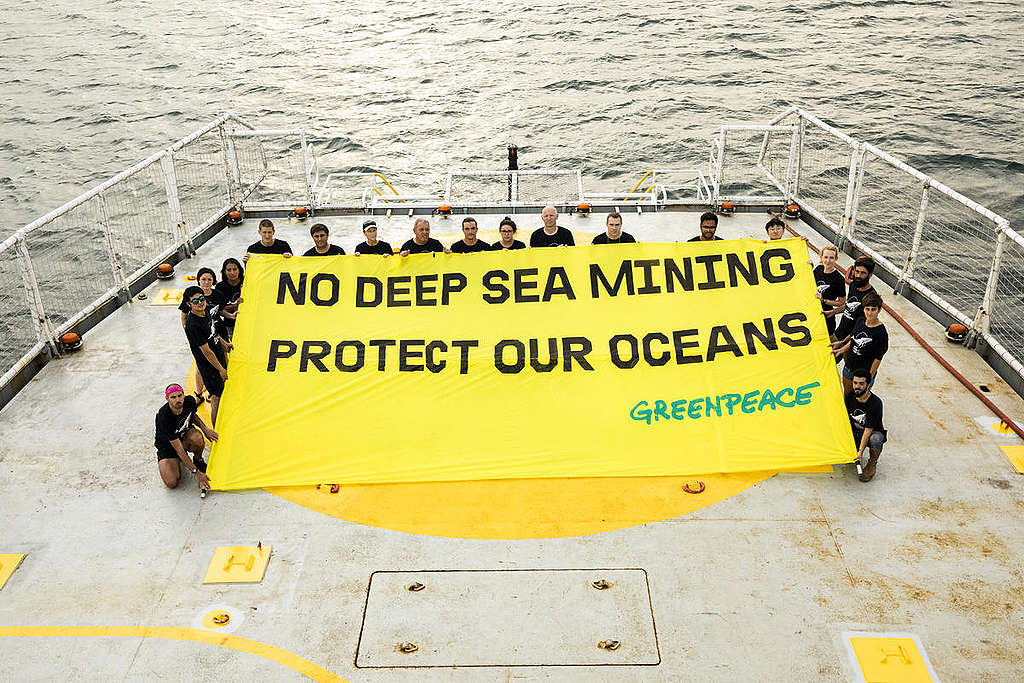
Global Ocean Treaty
Through the Protect the Oceans campaign, Greenpeace is working with nations across the globe to forge a new Global Ocean Treaty that would provide a legal framework for biodiversity protections in nearly half of the planet covered by international waters.
Our goal is to achieve a network of fully protected ocean sanctuaries that will cover at least 30% of the ocean by 2030. Due to the political power of deep-sea mining interests, there is no guarantee this Treaty will be granted the authority to put in place protections against this emerging destructive industry, but Greenpeace and our allies are working tirelessly to see that it does.
Bearing Witness Against Deep Sea Miners
While no commercial projects are yet permitted in the global ocean, exploratory deep-sea mining is licensed by the United Nations through the International Seabed Authority. These operations are destructive and may have irreversible consequences that even deep-sea mining companies admit are wholly unknown due to the lack of sufficient science.
Greenpeace is meeting these miners at sea, at port, and in the conference rooms of global politics. We are bearing witness to their destructive activities, and “members of our global network have taken action to prevent their assaults upon the sea.
What’s Our End Goal?
We have a unique chance to stop this new threat in its tracks — and we need your help. We must call on our governments to create a strong treaty that can open the door to a global network of ocean sanctuaries, and set high standards to protect the global oceans from destructive industries.
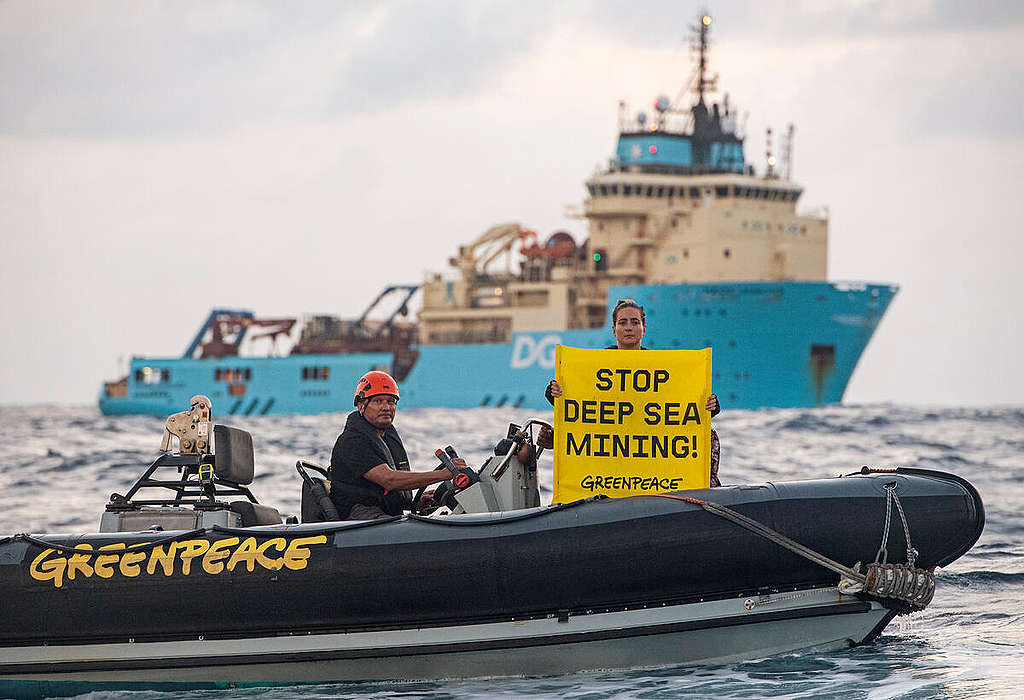
Confronting James Cook Vessel in the Pacific Ocean
Greenpeace Confronts Deep-sea
Mining Expedition in the Pacific Ocean
Greenpeace International
Eastern Pacific Ocean (March 26, 2023) — Greenpeace International activists peacefully confronted UK Royal Research Ship James Cook in the East Pacific waters as it returned from a seven-week long expedition to a section of the Pacific Ocean targeted for deep-sea mining.
An activist scaled the side of the moving vessel to unfurl a banner reading “Say No to Deep-sea mining”, while two Māori Indigenous activists swam in front of the RRS James Cook, one holding the Māori flag and the other a flag reading “Don’t Mine the Moana”. [1]
“While political tensions flare over whether to allow deep-sea mining to start, commercial interests are pressing ahead at sea like it’s a done deal. As if sending a ship to enable further destruction of our ecosystems wasn’t offensive enough, sending one named after the most notorious coloniser of the Pacific is a cruel insult.
For too long, Pacific peoples have been excluded from decisions that impact our territories and waters. If governments don’t stop this industry from starting, the darkest days of history will repeat. We reject a future with deep-sea mining”, said James Hita, Māori activist and Pacific lead for Greenpeace International’s deep-sea mining campaign.
Delegates from world governments are currently gathered at the International Seabed Authority (ISA) in Kingston, Jamaica, to debate whether or not this destructive industry could get a greenlight this year. [2] Meanwhile, deep-sea mining firm UK Seabed Resources is using the RRS James Cook’s expedition — funded by public money from the UK — to take further steps toward beginning mining tests even before negotiations have a chance to conclude.[3]
The RRS James Cook’s expedition, referred to as Smartex (Seabed Mining And Resilience To Experimental Impact) [3], is publicly funded in the UK by the Natural Environment Research Council (NERC) with partners including the Natural History Museum, British Geological Survey, and JNCC as well as a number of UK universities. The UK sponsors some of the largest areas for deep-sea mining exploration, covering 133,000km of the Pacific Ocean.
More than 700 scientists from 44 countries have already opposed the industry by signing an open letter calling for a pause.
“Marine ecosystems and biodiversity are in decline and now is not the time to start industrial exploitation of the deep sea. A moratorium is needed to give us time to fully understand the potential impacts of deep-sea mining to make a decision as to whether to go ahead with it. I personally have lost trust in the current management of the ISA to make this decision, and it is very clear that a few people, driven by economic interest, have distorted a process which should represent the interests of all of humankind,” said Alex Rogers, professor of biology at Oxford University and Director of Science at REV Ocean.
The Smartex Expedition visited one of these areas licensed for exploration and returned to sites where previous test mining took place in 1979 to monitor the long-term impacts of mining. Greenpeace International calls for all data on the ecosystem impact from seabed mining 44 years ago to be made available to help inform governments debating at the ongoing ISA meeting.
Deep-sea mining firm UK Seabed Resources is a Smartex project partner and its former parent company’s website states that this expedition is “the next phase of its exploration programme” — making it a necessary step towards the company’s planned mining tests later this year. [4][5]
This is not the first time concerns have been raised during ISA meetings to distinguish between research to enhance humanity’s understanding of the deep sea and exploration activities for deep-sea mining.
A letter signed by 29 deep sea scientists, delivered at a previous ISA session, stated that: “The international seabed belongs to all of us collectively. We recognise the privilege and responsibility of studying deep ocean systems for the benefit of human knowledge. Scientific research to understand how deep-sea ecosystems function and support vital processes is distinct from activities carried out under exploration contracts granted by the International Seabed Authority”.
Negotiations at the ISA meeting continue until 31 March. Last week diplomats accused the head of the ISA, Michael Lodge, of having lost the impartiality demanded by his position and interfering with the decision making of governments at the ISA to accelerate mining.
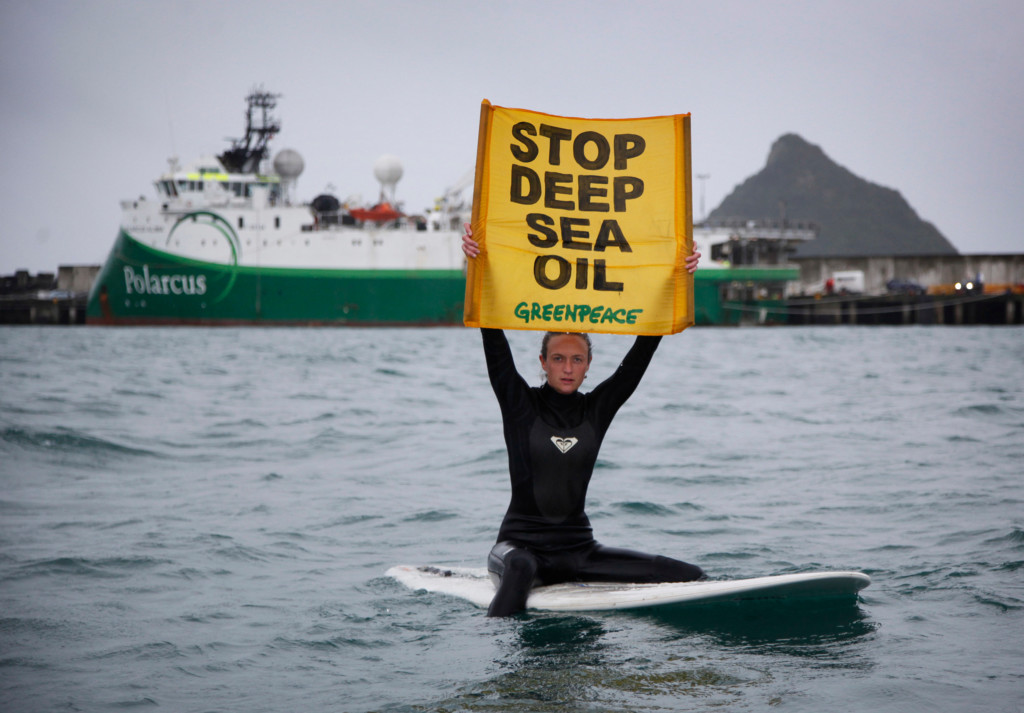
Notes
[1] For Pacific peoples, especially in Te Ao Māori mythologies, Moana encompasses the seas from shallow rock pools to the deepest depths of the high seas. Moana is the ocean. And with this, it speaks to the intrinsic relationship that all Pacific peoples have with the Moana.
[2] 31 contracts to explore for deep-sea mining viability, covering over a million square kilometres of the international seabed, have been given out by the International Seabed Authority (ISA). Rich nations dominate the development of deep-sea mining, sponsoring 18 of the 31 exploration licenses. China holds an additional 5 contracts, meaning only a quarter of the exploration contracts are held by developing nations. No African nation sponsors mineral exploration of the deep sea, and only Cuba from the Latin American region partly sponsors a licence as part of a consortium with 5 European nations.
[3] This expedition is part of the UK deep-sea mining company’s exploration programme for deep-sea mining, according to the company’s website, with the company’s 2020 environmental summary report detailing UK Seabed Resources’s involvement in Smartex from its early stages and referring to the company’s “material commitment” to the project. The company’s desire to move from exploration to exploitation is evident in UK Seabed Resources’ public calls for governments to allow deep-sea mining to start as soon as possible. Two staff members of UK Seabed Resources, including its director Christopher Willams, are listed as part of the Smartex project team.
These mining company officials have also attended the International Seabed Authority negotiations as part of the UK Government delegation (Steve Persall in 2018, Christopher Williams several times but most recently in November 2022).
This expedition paves the way for the British deep-sea mining company to test mining machinery later in 2023. The expedition website details how the James Cook has been collecting baseline data for potential new tests in UK’s mining exploration sites, with a planned follow-up expedition in 2024 after the mining tests
[4] UKSR described its recent change in ownership as part of transitioning from exploratory activities “towards a credible path to exploitation,” although the decision to open up the ocean to mining lies with governments. Loke, the Norwegian company buying UKSR, described the move as “a natural continuation of the strong existing UK-Norway strategic cooperation in the offshore oil and gas industry”.
[5] UKSR was, until recently, owned by the UK arm of the US company Lockheed Martin. On March 16, Loke Marine Minerals announced that it had acquired UKSR. Loke’s Chairman, Hans Olav Hide, told Reuters: “We’ve got the approval from the UK government… Our ambition is to start extraction from 2030.”
Contacts
For interviews at the ISA in Kingston: Louisa Casson, Senior campaigner for the Stop Deep-sea mining Campaign, Greenpeace International: louisa.casson@greenpeace.org, +44 (0) 7772304063
In London: Sol Gosetti, Media Coordinator for the Stop Deep-sea mining campaign, Greenpeace International: sol.gosetti@greenpeace.org, +44 (0) 7807352020, WhatsApp +44 (0) 7380845754
Greenpeace International Press Desk: pressdesk.int@greenpeace.org, +31 (0) 20 718 2470 (available 24 hours)
